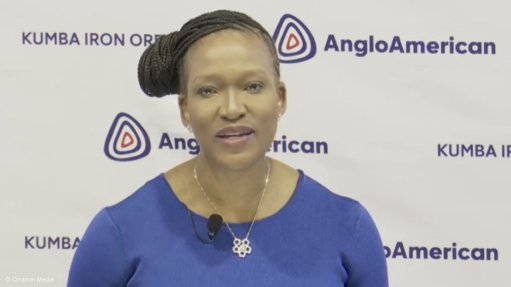
Kumba Iron Ore CEO Mpumi Zikalala.
Photo by: Creamer Media
JOHANNESBURG (miningweekly.com) – The commitment of South Africa’s new multi-party government to continued reform of this country’s iron-ore logistics was hailed on Tuesday by Kumba Iron Ore.
Speaking during the presentation of half-year results covered by Mining Weekly, Kumba CEO Mpumi Zikalala spoke of the current public-private partnership model having the potential to create powerful logistics reform. (Also watch attached Creamer Media video.)
“The good thing is that the independent technical assessment is being finalised to come out in the third quarter,” Zikalala said in response to Morgan Stanley analyst Brian Morgan during question time.
The transparency of the new Transnet leadership was highlighted as providing an opportunity for significant collective public-private logistics upliftment.
“We’re encouraged by the statements that are coming out from the likes of the new Minister of Transport, Barbara Creecy, and there’s clearly continuity because we have been working with the various teams and that includes the team in the Presidency because ultimately, they are driving the work around the National Logistics Crisis Committee,” Zikalala stated in response to Barclays’ Ian Rossouw.
The improved outlook follows the Kumba business being challenged by the decline in logistics performance.
“We’ve proactively sought ways to mitigate the impact by optimising our operating model, as well as collaborating with Transnet, the Ore Users Forum, as well as the National Logistics Crisis Committee to improve logistics performance.
“However, rail’s poor first-half performance impacted our sales. In the first quarter, sales fell by 9% compared with the fourth quarter of 2023.”
During April, Kumba, together with its Ore Users Forum partners, assisted Transnet with the repairs on a stacker reclaimer at the Port of Saldana.
This was followed by a five-day proactive mini shut of the port and rail.
Improvements made as a result of the stacker reclaimer repairs, coupled with work performed during the mini shut, translated into a 12% increase in sales in the second quarter.
Unfortunately, Kumba did not see the same performance uplift on rail after the mini shut.
This does, however, demonstrate the powerful impact of partnerships and the difference that this can make when it comes to logistics performance.
"In the second half, our priority is supporting Transnet as it prepares for its annual maintenance shutdown, which will take place at the beginning of the fourth quarter."
Before then, the independent technical assessment is expected to be completed. This assessment aims to expedite delivery of critical projects through mutual collaboration between the Ore Users Forum as well as Transnet.
Reform under the leadership of the Presidency as well as the National Treasury through Operation Vulindlela is driving government and business collaboration, where practical interventions and reforms to freight logistics policy are taking shape. These reforms support private-sector participation and investment to improve the logistics network.
“We’re also encouraged by the commitment from government that there will be an increased emphasis on implementation and delivery when it comes to the policy reforms,” added Zikalala.
Kumba Iron Ore CFO Bothwell Mazarura outlined the work being done by the reconfigured Johannesburg Stock Exchange-listed Anglo American group company to reduce costs.
Since early 2022, iron-ore prices have averaged in a tight range of around $120/t. In the first half of this year, the benchmark price averaged $118/t with strong steel exports from China offsetting domestic demand on the back of weak property markets.
This meant that year-on-year, crude steel production decreased by 1%. Narrow mill margins in the first quarter forced mills to lower their capacity utilisation levels.
“Since then, we’ve seen an improvement in margins, resulting in increased steel output,” Mazarura reported.
Iron-ore supplied from traditional and non-traditional sources increased owing to less weather disruptions in the first half.
“Notably, Ukraine exports have more than doubled with the recovery of the Black Sea shipping route.
“From below five cents per tonne in April, lump premium recovered to about 20 cents, and is currently supported by relatively low stock levels at Chinese ports,” Mazarura outlined.
Regarding Kumba’s product quality and customer strategy, he said: “Our iron-ore qualities are second to none and we pursue a diversified sales strategy that maximises the value of our products. However, in the first half the share of China in total sales rose to 55%, reflecting a drop in demand from our traditional markets, such as Europe, Japan and South Korea.
“As economic conditions improve, we expect this trend to improve within our long-term target of 45% to 55% of our volume going to non-China markets. This year, the premium has reduced to near breakeven levels due to less favourable timing effects.
“While our realised price is now similar to Australian peers like Rio Tinto and BHP, it is important to note that they benefit from being much closer to China, not just from lower freight costs, but also because negative timing effects would have been far less severe due to the much shorter sailing time for them,” Mazarura pointed out.